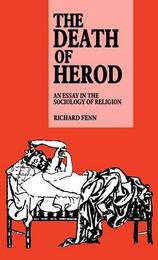
|
The Death of Herod: An Essay in the Sociology of Religion
Hardback
Main Details
| Title |
The Death of Herod: An Essay in the Sociology of Religion
|
| Authors and Contributors |
By (author) Richard Fenn
|
| Physical Properties |
| Format:Hardback | | Pages:212 | | Dimensions(mm): Height 216,Width 140 |
|
| Category/Genre | Church history
Biblical studies |
|---|
| ISBN/Barcode |
9780521414821
|
| Classifications | Dewey:225.6 |
|---|
| Audience | | Professional & Vocational | | Tertiary Education (US: College) | |
|---|
|
Publishing Details |
| Publisher |
Cambridge University Press
|
| Imprint |
Cambridge University Press
|
| Publication Date |
31 July 1992 |
| Publication Country |
United Kingdom
|
Description
This work is intended to be a 'taster' to sociological method for students of the New Testament. While the sociology of the Bible is presently something of a growth industry, Richard Fenn believes that an introduction to the peculiar craft of sociology is missing, a book which demonstrates how fruitful the relationship between the social sciences and biblical studies can be when sociological method is imaginatively applied to the New Testament. Fenn's point of departure is the particular historical event of the death of Herod the Great. He focuses on Josephus' account of the trials of Herod's sons, the death of Herod himself, and the crisis of succession which followed his death. Josephus' account is shown to provide a rich sociological resource, in that he observes how speech was used to conceal rather than to convey individuals' true interests and commitments. His account also reveals the failure of the trial as a critically important institution for restoring confidence in public discourse. The result, the author argues, is the intensification of conflict within, and between, generations, at every level of Palestinian society. The succession-crisis thus becomes a crisis in the ability of Palestinian society to reproduce itself from one generation to the next, the effects of which can still be observed in the legacy of the Jesus movement. The example presented therefore casts light on the general question of how societies may pass on their sources of authority from one generation to another.This work is intended to be a 'taster' to sociological method for students of the New Testament. While the sociology of the Bible is presently something of a growth industry, Richard Fenn believes that an introduction to the peculiar craft of sociology is missing, a book which demonstrates how fruitful the relationship between the social sciences and biblical studies can be when sociological method is imaginatively applied to the New Testament. Fenn's point of departure is the particular historical event of the death of Herod the Great. He focuses on Josephus' account of the trials of Herod's sons, the death of Herod himself, and the crisis of succession which followed his death. Josephus' account is shown to provide a rich sociological resource, in that he observes how speech was used to conceal rather than to convey individuals' true interests and commitments. His account also reveals the failure of the trial as a critically important institution for restoring confidence in public discourse. The result, the author argues, is the intensification of conflict within, and between, generations, at every level of Palestinian society. The succession-crisis thus becomes a crisis in the ability of Palestinian society to reproduce itself from one generation to the next, the effects of which can still be observed in the legacy of the Jesus movement. The example presented therefore casts light on the general question of how societies may pass on their sources of authority from one generation to another.
Reviews"The author has chosen a useful way in which to present the sociologist's craft to the reader. Zeroing in on a particular set of circumstances keeps the book from becoming a dull, theoretical account, and Fenn adds to the appeal of the book by making a number of observations about NT passages that parallel or exemplify what he finds in Josephus's reports...it is instructive to see what happens when a familiar text is viewed through eyes that are trained to see phenomena differently than a traditional historian might." James Vanderkam, Critical review
|